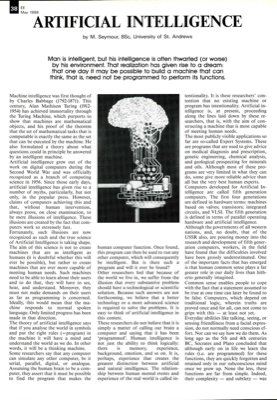Article
Artificial Intelligence

38 EE May 1988 ARTIFICIAL INTELLIGENCE by M. Seymour, BSc, University of St. Andrews Man is intelligent, but his intelligence is often thwarted (or worse) by his environment. That realization has given rise to a dream: that one day it may be possible to build a machine that can think, that is, need not be programmed to perform its functions. Machine intelligence was first thought of by Charles Babbage (1792-1871). This century, Alan Mathison Turing (1912- 1954) has achieved immortality through the Turing Machine, which purports to show that machines are mathematical objects, and his proof of the theorem that the set of mathematical tasks that is computable is exactly the same as the set that can be executed by the machine. He also formulated a theory about what questions could in principle be answered by an intelligent machine. Artificial intelligence grew out of the work on digital computers during the Second World War and was officially recognized as a branch of computing scienc...


Discussion (0 comments)